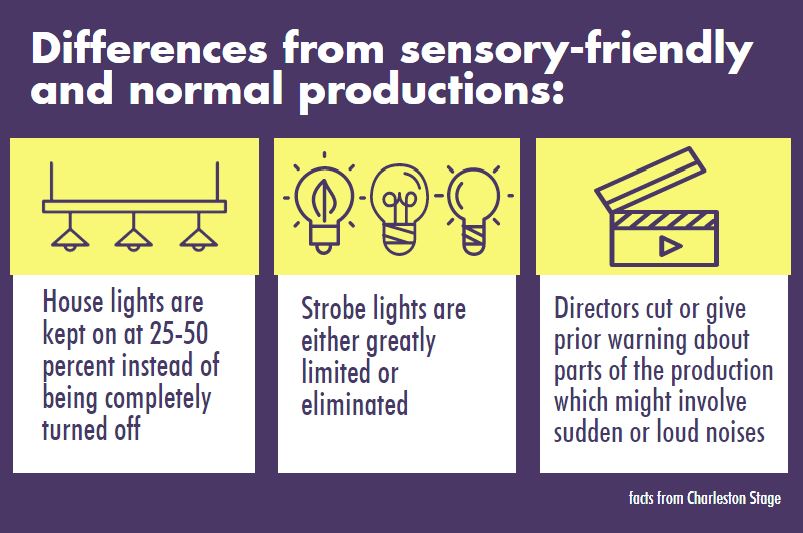Whitman drama: provide sensory-friendly versions of productions
Graphic by Meimei Greenstein
April 17, 2018
As the lights went down in the auditorium for the Thursday night performance of The Curious Incident of the Dog in the Night-Time, the audience eagerly awaited high-quality lighting and sound that would accompany the production. Most audience members were able to enjoy the entire show, but for freshman Harry Burdick, who has autism and epilepsy, some scenes, like ones in which flashing lights were pointed towards the audience, were impossible to watch.
To create a more inclusive theater environment, Whitman drama should create an additional production of each of their musicals and plays that is sensory-friendly so all students have the opportunity to enjoy the productions.
A sensory-friendly production is catered towards individuals with sensory needs such as people on the autism spectrum or those who experience anxiety or other cognitive and physical disabilities. In a sensory-friendly production, the house lights are kept on at 25-50 percent instead of being completely turned off, and strobe lights are either greatly limited or eliminated. Another key aspect of sensory-friendly performances is that directors cut or give prior warning about parts of the production which might involve sudden or loud noises.
At Whitman, many students aren’t able to appreciate the shows in the same way their peers can because of the lack of sensory-friendly productions available. Harry Burdick said he is the only person he knows in his program at Whitman who goes to see the school’s drama productions, and even so, his sister Morgan has to cover his eyes during certain parts of the shows. If an additional sensory-friendly performance was added, many more of his friends could come to the show, which would be great, Burdick said.
It wouldn’t be unheard of for a high school to create sensory-friendly performances; Holy Child, a private school in Potomac, offers additional sensory-friendly productions of their musicals the night before their opening night, and the local theater Imagination Stage has a sensory-friendly production of each of their shows. Both locations stress the importance of everyone being able to appreciate the productions put on, and Imagination Stage even has a system where prior to any startling events in the play, people on the sides of the stage raise glow sticks so the audience has a warning. Whitman’s drama department could easily replicate these aspects.
Admittedly, the implementation of sensory-friendly productions at Whitman would require more time and professional assistance to ensure the performance is truly sensory friendly, which would make each production more of a time commitment for involved students.
However, current drama advisor Jonathan Rizzardi, who has professional experience with sensory-friendly productions, says many students are open to the idea. Rizzardi said the drama students even suggested that Curious Incident should have a sensory-friendly performance, but last-minute leadership changes didn’t allow for this option. Though Rizzardi won’t serve as advisor for Whitman drama next year, he believes that with time and planning, a sensory-friendly performance could be done.
Whitman has an award-winning drama department that puts on shows everyone should be able to enjoy. But for some students, the only way this is possible is through sensory-friendly productions.









